7 Common 2015 Dodge Grand Caravan Problems and Solutions

Overview
This article explores seven prevalent issues encountered by the 2015 Dodge Grand Caravan, such as:
- Engine failure
- Transmission problems
- Electrical system failures
- Brake system concerns
Each issue is illustrated with real-world examples and statistics, underscoring the significance of regular maintenance and prompt action. By addressing these challenges, vehicle owners can enhance their safety and reliability, ultimately leading to a more dependable driving experience.
Introduction
In the realm of family vehicles, the 2015 Dodge Grand Caravan is notable for its versatility and spaciousness. However, many owners face a range of mechanical issues that can affect the vehicle’s performance and safety. Common problems include:
- Engine and transmission troubles
- Electrical system failures
- Brake concerns
Understanding the symptoms and causes of these issues is essential for maintaining the Grand Caravan’s reliability. By examining real-world experiences and expert insights, this article aims to equip owners with the knowledge necessary to identify potential issues early. This proactive approach ensures that their vehicle remains a dependable companion on the road.
Engine Failure: Common Causes and Symptoms in the 2015 Dodge Grand Caravan
Engine failure in the 2015 Dodge Grand Caravan problems can manifest through various symptoms, including unusual noises, stalling, and warning lights. Key causes of engine failure include:
- Oil Leaks: Frequently originating from the oil filter adapter, these leaks can lead to dangerously low oil levels, risking significant engine damage. Reports indicate that vehicles with around 150,000 miles have experienced oil leaks, underscoring the importance of regular inspections for vehicles at this mileage.
- Timing Chain Issues: A deteriorating timing chain can result in catastrophic engine damage if not addressed swiftly. This issue is critical, as it can lead to complete engine failure.
- Ignition System Problems: Defective spark plugs or ignition coils can cause misfires, leading to diminished engine performance. Regular upkeep, including prompt substitution of these parts, is crucial to avoid escalation of these problems.
Real-world examples illustrate the severity of these issues. One owner reported experiencing engine jerking and power loss, with the vehicle failing to exceed 20 mph, leading to ongoing problems with acceleration and shifting that raised significant safety concerns. Furthermore, there have been alarming reports of the large vehicle shutting down unexpectedly while in motion, particularly concerning for families with young children. One user shared their experience, stating, “On March 13, 2015, I was stopped at a traffic light waiting to turn left. I had my foot on the brake and the van shut off.”
The criticism surrounding the 2015 Dodge Grand Caravan problems includes insufficient recall responses from the manufacturer, particularly regarding transmission failures, which have been reported multiple times even after replacements. Understanding these common engine problems and their symptoms is crucial for owners to ensure safety and reliability.
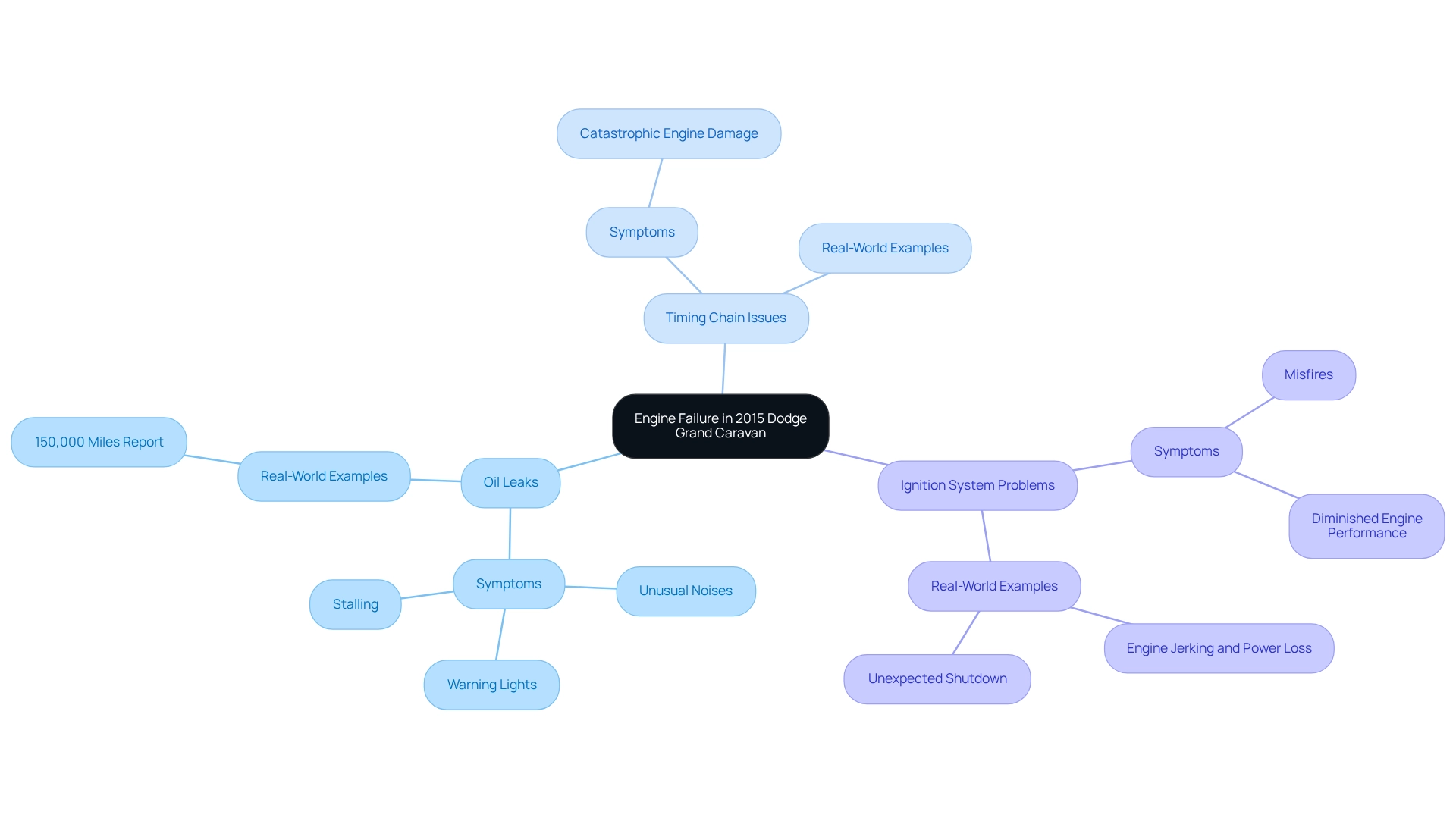
Transmission Problems: Identifying Signs of Trouble in Your Grand Caravan
Transmission problems in the 2015 Dodge Grand Caravan often manifest through several key indicators:
- Delayed Shifting: Difficulty in shifting gears may suggest low transmission fluid levels or internal mechanical issues. Regular monitoring of fluid levels can help prevent more severe problems.
- Slipping Gears: An unexpected change in gears can indicate a failing transmission. This symptom is critical to address promptly, as it can lead to further complications.
- Unusual Noises: Grinding or whining sounds during operation are often signs of mechanical failure within the transmission system. These noises warrant immediate attention to avoid costly repairs.
Recognizing these signs is crucial. For instance, a case study involving a 2005 Dodge Grand Caravan revealed symptoms of ‘limp mode,’ where the vehicle struggled to shift properly, leading to aggressive downshifting while driving uphill. The mechanic’s evaluation indicated possible solenoid problems and debris in the transmission fluid, highlighting the necessity for comprehensive inspections and maintenance.
Statistics show that repairs for malfunctioning sensors and transmission problems can vary from hundreds to thousands of dollars, making early detection essential. Consulting a trusted mechanic is advisable if any of these symptoms arise, ensuring that potential problems are addressed before they escalate. As Tory Johnson, GMA Workplace Contributor, observes, ‘The things you have to go through to be an Expert are quite rigorous,’ emphasizing the importance of expert guidance in diagnosing these challenges. Moreover, it is essential to mention that the 2015 Dodge Grand Caravan problems, especially regarding transmission issues, are fairly frequent, further emphasizing the necessity for caution among owners.
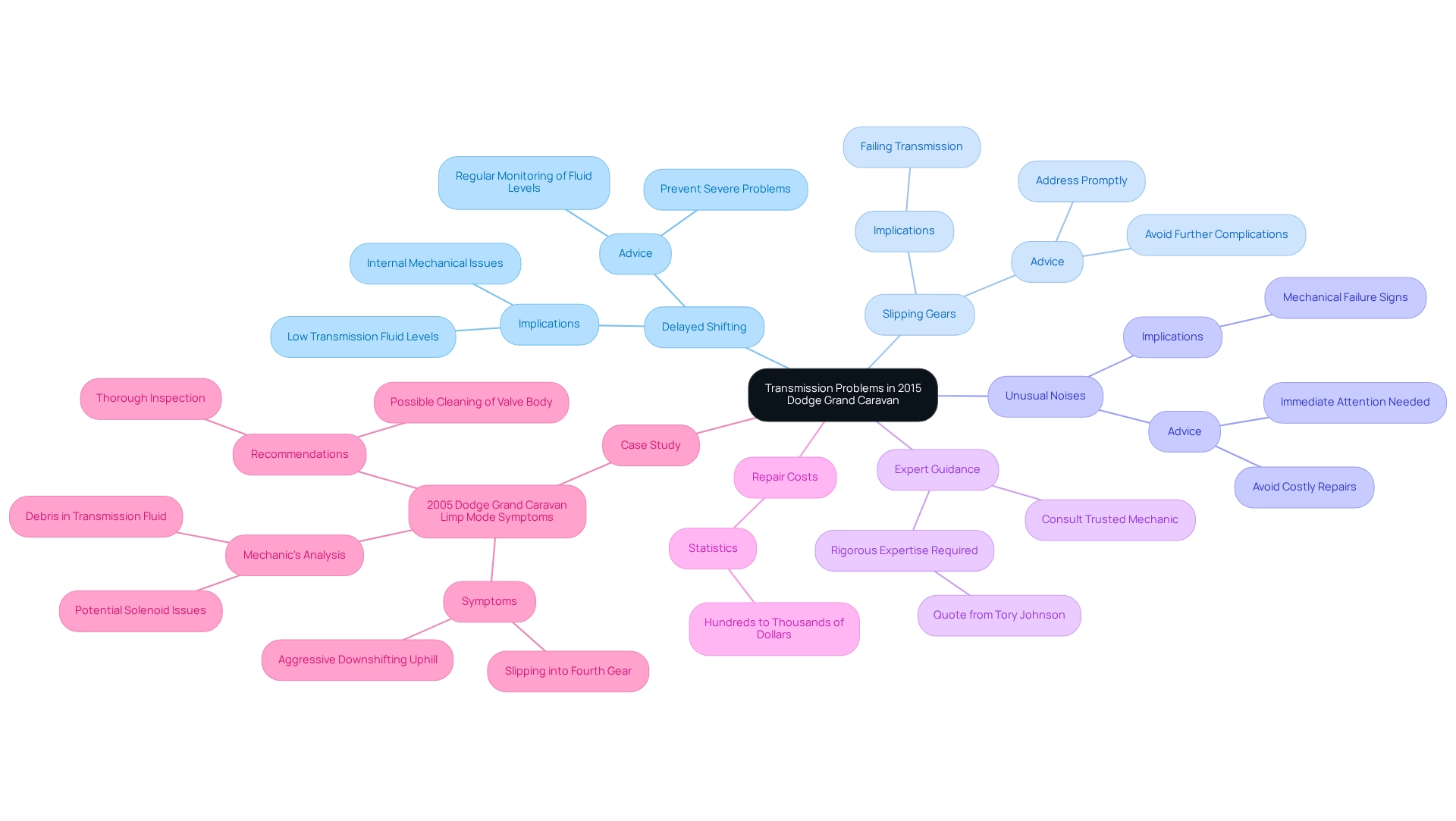
Electrical System Failures: Troubleshooting Common Issues in the 2015 Dodge Grand Caravan
The 2015 Dodge Grand Caravan problems often include electrical system failures that can significantly impact vehicle performance. Key issues include:
- Battery Problems: Symptoms such as dimming lights or difficulty starting the engine often indicate battery issues. Regular checks can prevent unexpected breakdowns, ensuring reliability on the road.
- Faulty Alternator: The illumination of the battery light on the dashboard frequently points to alternator failure. This can disrupt the entire electrical system, leading to further complications that may require costly repairs.
- Power Window Malfunctions: Issues with power windows are commonly caused by faulty switches or motors. Conducting routine inspections can help identify these problems early, preventing more extensive repairs and enhancing overall vehicle functionality.
In a case study focused on diagnosing electrical problems in Dodge Caravans, it was noted that recognizing symptoms like flickering lights and burning smells can be crucial for timely intervention. The research indicates that instruments like a multimeter and specific procedures for testing the battery and alternator can assist in identifying these problems. Expert help from automotive electrical technicians may be required to tackle these issues effectively, ensuring safety and performance.
Furthermore, data from RepairPal suggest that around 30% of owners report 2015 Dodge Grand Caravan problems, particularly electrical system failures, making it one of the most frequent issues encountered by this model. By recognizing these common problems and their symptoms, owners can troubleshoot effectively and seek professional assistance when necessary, ensuring their vehicles remain safe and dependable. As Gregory White observes, “Electrical complications on Caravan models can arise from multiple sources, including battery troubles, alternator malfunctions, defective wiring, nonfunctioning sensors, and fuse-related difficulties.
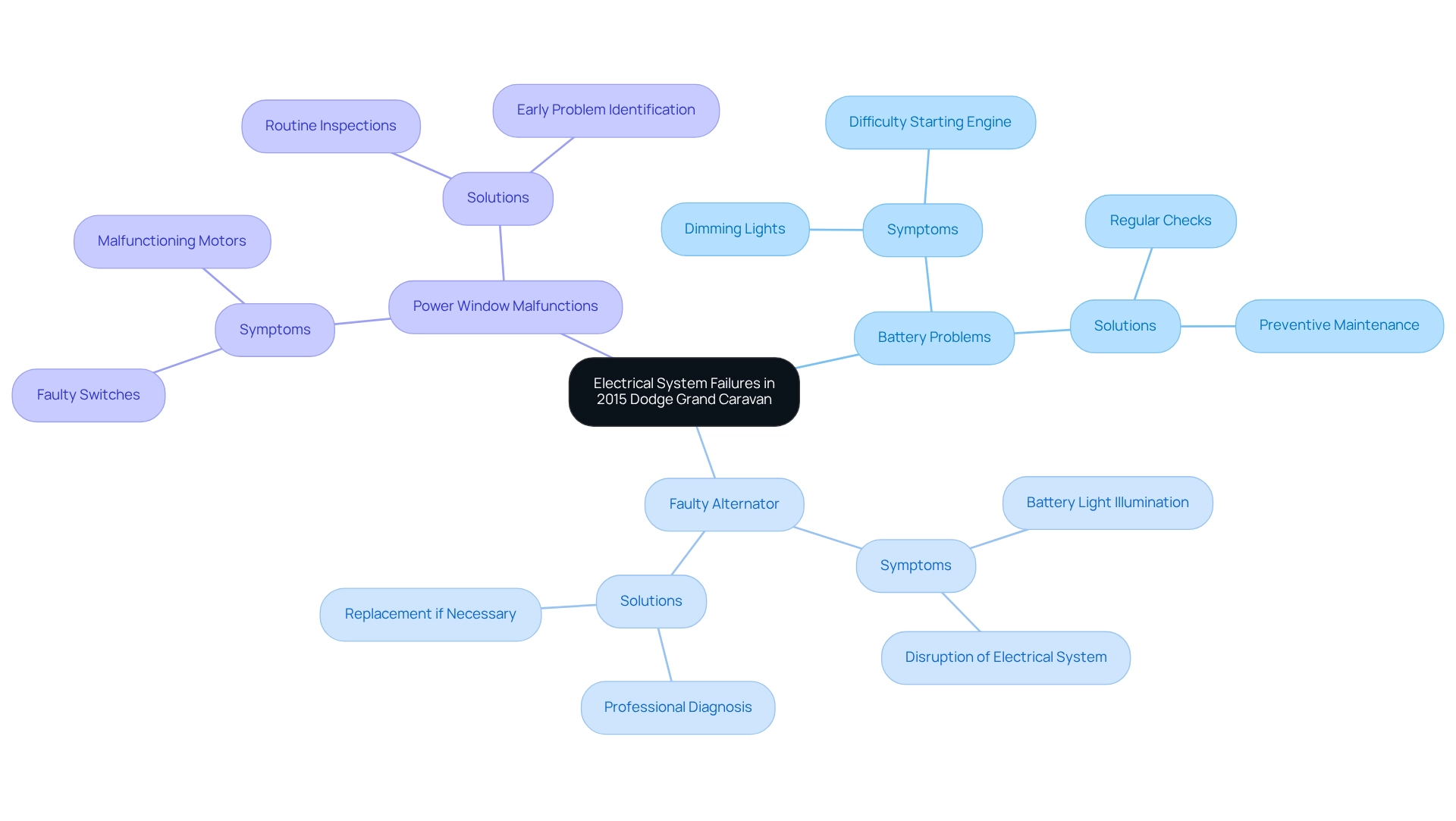
Brake System Issues: Understanding Risks and Solutions for the Grand Caravan
The 2015 Dodge Grand Caravan problems related to the brake system can manifest in various significant ways, impacting both safety and performance. Understanding these issues is vital for maintaining the vehicle’s reliability.
-
Premature Wear: Many owners report that brake pads and rotors wear out faster than expected, significantly reducing braking efficiency. This premature wear is often linked to the vehicle’s weight and driving conditions, leading to more frequent replacements than usual.
-
ABS Malfunctions: The Anti-lock Braking System (ABS) is essential for maintaining control during sudden stops. However, malfunctions can trigger warning lights and jeopardize braking performance. Regular diagnostics can help identify these issues before they escalate.
-
Fluid Leaks: Brake fluid leaks present a severe risk, potentially resulting in complete brake failure. Routine inspections of the brake system can help detect leaks early, ensuring that the braking system remains functional and safe.
-
Expert Opinions on Brake Pad Wear: Specialists emphasize the importance of monitoring brake pad wear closely, especially in specific vehicle models. They advise replacing pads at the first signs of wear to prevent further damage to the rotors and maintain optimal braking performance. One anonymous expert remarked, “Regular maintenance is key to avoiding costly repairs down the line.”
-
Real-Life Examples: A case study involving a 2000 model from the manufacturer illustrated a scenario where an owner encountered significant brake problems due to defective cables in the parking brake system. After replacing the cables and pedal assembly, functionality was restored, highlighting the importance of timely maintenance.
-
Statistics on 2015 Dodge Grand Caravan Problems: Recent data reveals that 2015 Dodge Grand Caravan problems, particularly brake system failures, are a prevalent concern among owners, with a notable percentage reporting issues related to premature wear and ABS malfunctions. This trend underscores the necessity for proactive maintenance and regular checks.
By being aware of the 2015 Dodge Grand Caravan problems with the brake system and addressing them promptly, owners can enhance the safety and longevity of their vehicle. Top5.com is dedicated to providing quality and relevant information, assisting consumers in making informed decisions about their vehicle maintenance.
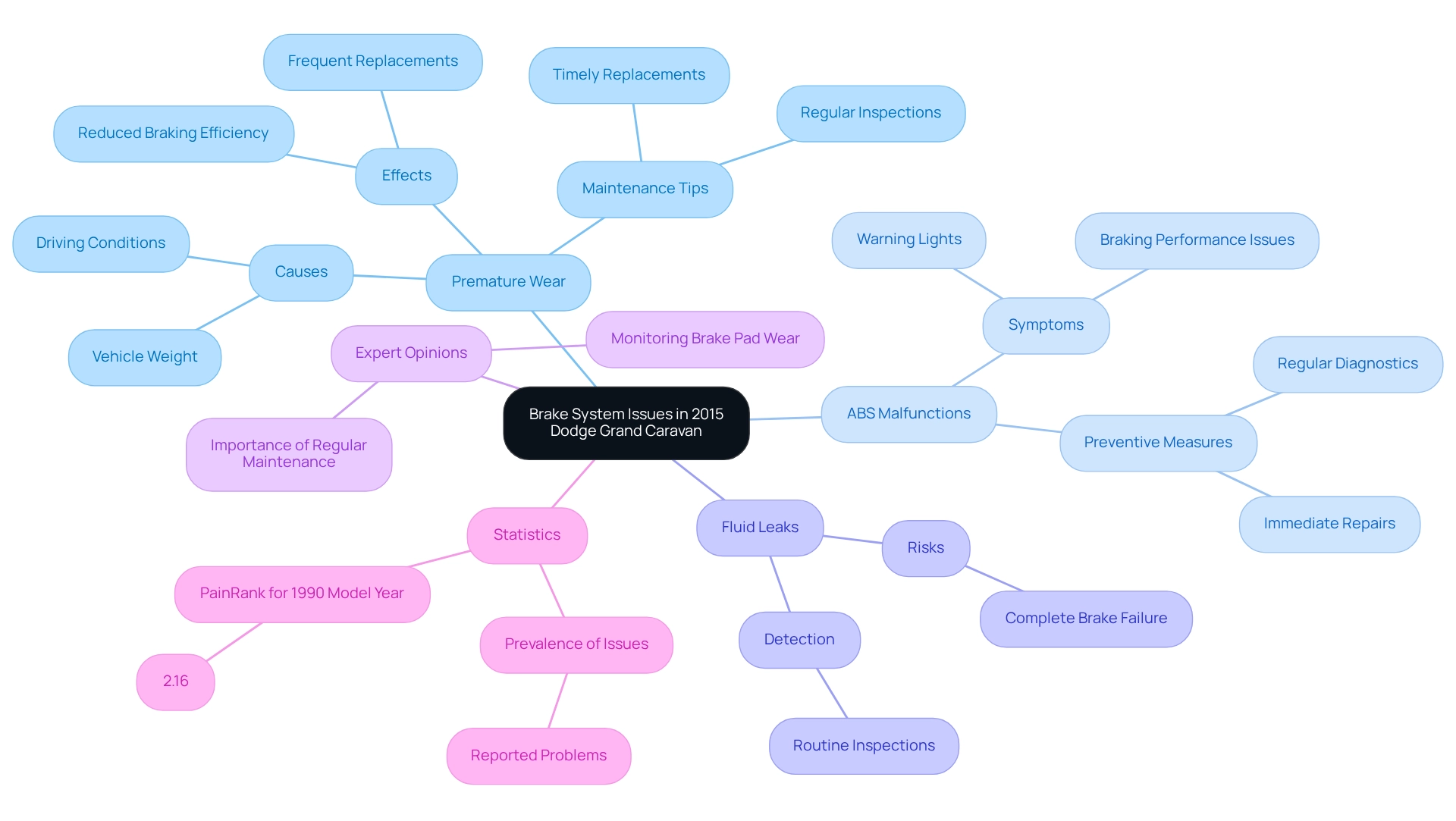
Maintenance and Recalls: Essential Tips for Keeping Your 2015 Dodge Grand Caravan Safe
To maintain your 2015 Dodge Grand Caravan in peak condition, consider the following essential tips:
-
Follow the Maintenance Schedule: Adhering to the manufacturer’s recommended service intervals is crucial. Regular oil changes, tire rotations, and brake inspections assist in avoiding more significant problems in the future. Experts emphasize that consistent maintenance can significantly extend the lifespan of your vehicle.
-
Check for Recalls: Staying informed about recalls is vital for safety. The 2015 Dodge Grand Caravan has experienced multiple recalls, including significant ones initiated on August 18, 2016. Vehicle owners should regularly check for open recalls using their VIN to ensure timely resolution of any safety risks.
-
Regular Inspections: Conduct routine inspections of fluid levels, brakes, and electrical systems. Timely identification of possible problems can prevent you from expensive repairs in the future. For instance, reports from owners of the 2015 Dodge Grand Caravan have highlighted recurring problems with the climate control system, such as non-operational vent controls and refrigerant leaks in the rear A/C unit. Addressing these concerns promptly can enhance comfort and reliability. A case study titled ‘Climate System Failures in 2015 Vehicle’ illustrates the 2015 Dodge Grand Caravan problems, highlighting the need for vigilance in upkeep.
-
Real-World Example: One owner reported that their engine developed a shudder, followed by violent shaking, with the engine light flashing. After four separate attempts over six weeks to repair the problem, the dealership initially blamed it on the oxygen sensor and spark plugs before finally identifying the issue. This highlights the potential consequences of neglecting maintenance.
By following these maintenance tips, such as setting reminders for maintenance checks or using a maintenance tracking app, you can help ensure that your 2015 Dodge Grand Caravan problems are minimized, keeping it safe and reliable for years to come.
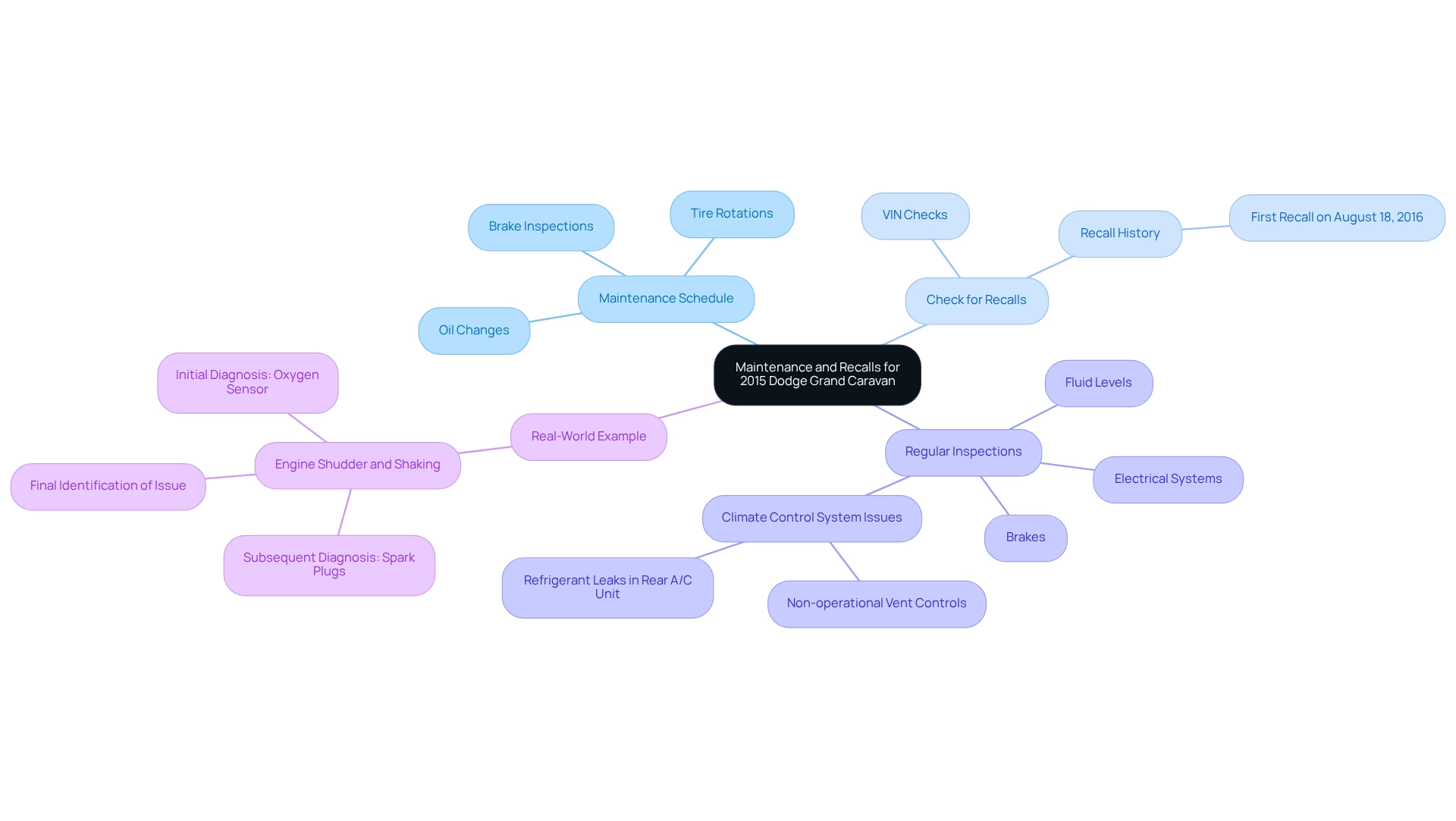
Conclusion
The 2015 Dodge Grand Caravan is recognized for its spaciousness and versatility, yet it comes with a range of mechanical challenges that owners must address to ensure safety and reliability. Common issues include:
- Engine failures, which may manifest as oil leaks and timing chain problems
- Transmission troubles indicated by delayed shifting and slipping gears
- Electrical system failures that can disrupt daily operations
- Brake system concerns, such as premature wear and ABS malfunctions, present significant risks
Understanding these problems is essential for proactive vehicle maintenance. By identifying symptoms early and following a diligent maintenance schedule, owners can reduce the risks associated with these prevalent issues. Regular inspections and staying informed about recalls are crucial steps in protecting the vehicle’s performance and longevity.
Ultimately, knowledge empowers owners of the 2015 Dodge Grand Caravan. With the right information and a proactive approach, they can effectively navigate these challenges, ensuring their vehicle remains a dependable companion on the road for years to come. Taking these steps not only enhances safety but also contributes to a smoother, more enjoyable driving experience.
Frequently Asked Questions
What are the symptoms of engine failure in the 2015 Dodge Grand Caravan?
Symptoms of engine failure can include unusual noises, stalling, and warning lights. Specific issues may manifest as engine jerking, power loss, and the vehicle failing to exceed 20 mph.
What are the key causes of engine failure in the 2015 Dodge Grand Caravan?
Key causes include oil leaks, timing chain issues, and ignition system problems. Oil leaks can lead to dangerously low oil levels, timing chain deterioration can cause catastrophic damage, and defective spark plugs or ignition coils can result in misfires and diminished performance.
How can oil leaks affect the engine?
Oil leaks, often originating from the oil filter adapter, can lead to dangerously low oil levels, risking significant engine damage. Regular inspections are important, especially for vehicles around 150,000 miles.
Why are timing chain issues critical?
A deteriorating timing chain can lead to catastrophic engine damage if not addressed swiftly, potentially resulting in complete engine failure.
What ignition system problems should owners be aware of?
Defective spark plugs or ignition coils can cause misfires, leading to reduced engine performance. Regular maintenance and prompt replacement of these parts are crucial.
Are there real-world examples of engine failure in the 2015 Dodge Grand Caravan?
Yes, one owner reported engine jerking and power loss, with the vehicle shutting off unexpectedly while in motion, raising safety concerns, particularly for families with young children.
What criticism has the 2015 Dodge Grand Caravan faced regarding engine problems?
The vehicle has faced criticism for insufficient recall responses from the manufacturer, particularly concerning transmission failures reported multiple times even after replacements.
What are the signs of transmission problems in the 2015 Dodge Grand Caravan?
Signs of transmission problems include delayed shifting, slipping gears, and unusual noises such as grinding or whining sounds during operation.
Why is it important to recognize transmission problems early?
Early detection of transmission problems is crucial to avoid costly repairs, as issues can escalate if not addressed promptly. Repairs can vary from hundreds to thousands of dollars.
What should an owner do if they experience symptoms of transmission issues?
It is advisable to consult a trusted mechanic to ensure potential problems are addressed before they escalate, as symptoms can indicate serious underlying issues.





